These magazine articles and blog posts published by Sojourners through the years pay tribute to the great South African leader.
Forgiveness
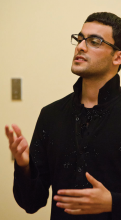
THE ULTIMATE BRAVERY might well be the courage to forgive one’s enemies and hold on to hope.
Nelson Mandela famously emerged from 27 years in prison as a reconciler and uniter, somehow free from bitterness and hatred. He was able to put into practice Jesus’ call to love our enemies—and thus became the father of the new South Africa.
Far from the upper echelons of power and fame, forgiving our enemies can be a difficult task, since “enemies,” by their very definition, aren’t easy to love. But in places of oppression, occupation, and routine violence, it’s even harder.
Take, for example, the story of a young man named Yousef Bashir. He grew up in the Gaza Strip, near an Israeli settlement known as Kfar Darom. In 2000, Palestinians rose up in protest against the Israeli occupation in what became known as the Second Intifada. In response, Israeli soldiers came to Yousef’s house and told his family to leave.
His father had dedicated his life to teaching Yousef and his brothers “how to coexist with the Israelis,” Yousef explained over lunch in Philadelphia early this winter, and he insisted on staying in their long-time family home. As a result, Yousef said, Israeli soldiers moved into the Bashir family’s house when he was 11 years old. They occupied the house until he was 15.
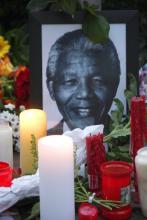
NELSON MANDELA was the most important political leader of the 20th century. While Roosevelt and Churchill helped protect the West and the world from Hitler’s Nazism, Mandela heroically exemplified the movement against the colonialism and racism that oppressed the global South, shown so dramatically in South Africa’s apartheid. And from a Christian point of view, he combined justice and reconciliation like no other political leader of his time, shaped by the spiritual formation of 27 years in prison.
Shortly after Mandela was released from prison, he came to New York to meet with a small group of Americans who had been involved in the anti-apartheid struggle, and I was blessed to join them. From the start, I felt in Mandela a moral authority I have never experienced with any political leader.
Attending Mandela’s inauguration in 1994 was a highlight of my life. We were picked up at the airport by friends, a couple who had both been in prison and tortured, but now she was about to become a member of the new South African parliament. We saw a group of the infamous South African security police. Having been interrogated by these thugs before, I immediately said, “Let’s get out of here!” To which they replied, “Don’t worry, Jim, they’re ours now.”
At the ceremony, joined by my South African friends, we watched Nelson Mandela announce his vision for a new rainbow nation. More than 100,000 people (and a billion or so more via TV) listened with tears in their eyes and great hope in their hearts.

Next to biblical nativity stories, How the Grinch Stole Christmas by Dr. Seuss is one of my favorite seasonal tales. We read it as a family every Christmas Eve.
While we typically view this vintage Dr. Seuss yarn as a reminder that there is more to Christmas than its trappings, it offers something unexpected too. It shares an example of restorative justice at work.

[Editor's note: This article first appeared in our December 2013 issue to commemorate the one year anniversary of the Sandy Hook shooting.]
IN THE YEAR since the mass shooting at Sandy Hook Elementary School in Newtown, Conn., last Dec. 14, thousands more have died by gun violence, and the NRA seems to stymie sane firearm measures at every turn. How do we stave off despair, hold on to hope, and keep moving forward when the odds feel overwhelming? —The Editors
Bigger Than Politics
What do we say to those who are weary?
by Brian Doyle
WHAT WOULD I SAY to those who are weary of assault rifles mowing down children of all ages, every few months, for as long as we can remember now? Oregon Colorado Wisconsin Pennsylvania Connecticut Texas Massachusetts Minnesota Virginia do I need to go on? I would say that this is bigger than politics. I would say this is about money. I would say Isn’t it interesting that we are the biggest weapons exporter on the planet? I would say that we lie when we say children are the most important things in our society. I would say that the next time a tall oily smarmy confident beautifully suited beautifully coiffed glowing candidate for office says the words family values, someone tosses an assault rifle on the stage with a small note attached to it that reads Is this more important than a kindergarten kid?
We all are Dawn and Mary in our hearts and why we wait until hell and horror are in front of us to unleash our glorious wild defiant courage is a mystery to me.
I would also say, quietly, that this is bigger than rage and anger and snarling at idiots who pretend to hide behind the Constitution. I would say this is also about poor twisted lonely lost bent young men no one paid attention to, no one really cared about. And I would say that people like Dawn Hochsprung and Mary Scherlach, who ran right at the bent twisted kid with the rifle in Newtown, are the flash of hope and genius here. Those are the people I will celebrate on Dec. 14. There are a lot of people like Dawn Hochsprung and Mary Scherlach, may they rest in peace. We all are Dawn and Mary in our hearts and why we wait until hell and horror are in front of us to unleash our glorious wild defiant courage is a mystery to me. But it’s there. And there are a lot of days when I think the whole essence of Christianity, the actual real no kidding reason the skinny Jewish man sparked the most stunning possible revolution in history, is to gently insistently relentlessly edge us away from our savagely violent past into a future where Dawn and Mary are who we are, and you visit guns in museums, and war is a joke, and defiant peace is what we say to each other all blessed day long.
Brian Doyle is the editor of Portland Magazine at the University of Portland (Oregon) and the author most recently of The Thorny Grace of It, a collection of spiritual essays.
-----
An Insanity of Rationality
This spiritual disease thrives on violence and calls it good.
by Joan Chittister, OSB
THERE IS A MADNESS abroad in the land, hiding behind the Constitution, brazenly ignoring the suffering of many who, over the years, have died in its defense, and operating under the banner of rationality. It’s a rare form of spiritual disease that thrives on violence and calls it good.
They want a proper response to violence, they tell us, and, most interesting of all, they insist that only violence can control violence. If “the good guys” have guns, this argument goes, “the bad guys” won’t be able to do any harm.
The hope? The hope lies only in those who refuse to feed this addiction to violence.
This particular insanity of rationality argues that violence is an antidote to violence. Then why do we find scant proof of that anywhere? Why, for instance, hasn’t it worked in Syria, we might ask. And where was the good of it in Iraq, the land of our own misadventures, where the weapons of mass destruction we went to disarm did not even exist and the people who died in the crossfire of that insanity had not harbored bin Laden. So how much peace through violencehave all the good guys on all sides really achieved?
The insanity of rationality says it is only reasonable to arm a population to defend itself against itself. And so, day after day, the level of violence rises around us as hunting rifles and small pistols turn into larger and larger weapons of our private little wars.
Clearly this particular piece of childish logic has yet to quell the gang violence in Chicago. It didn’t even work on an army base in Texas where, we must assume, the place was loaded with legal weapons.
What’s more, it does nothing to save the lives of the good guy’s children, who pick up the good guy’s guns at the age of 2 and 3 and 4 years old and turn them on the good guy fathers who own them.
So the mayhem only increases while white men in business suits insist that their civil rights have been impugned, their right to defend themselves has been taken from them, and more guns, larger guns, insanely damaging guns are the answer. Instead of hiring more police officers, they argue that arming students and teachers themselves, nonprofessionals, will do more to maintain calm and control the damage in situations specifically designed to cause chaos than waiting for security personnel would do.
It is that kind of creeping irrationality that threatens us all.
And in the end, it is a sad commentary on our society. We have now become the most violent country in the world while our industries collapse, our educational system declines, women are denied healthcare, our infrastructure is falling apart, and there’s more money to be made selling drugs in this country than in teaching school. No wonder gun pushers fear for their lives and sell the drug that promises the security it cannot possibly give while the country is becoming more desperate for peace and security by the day.
The hope? The hope lies only in those who refuse to feed this addiction to violence. These are they who remember again that we follow the one who said “Peter, put away your sword” when it was his own life that was at stake.
The hope is you and me. Or not.
Joan Chittister, OSB, a Sojourners contributing editor, is executive director of Benetvision, author of 47 books, and co-chair of the Global Peace Initiative of Women.
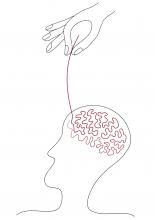
Autumn in Berkeley is not what lovers of changing seasons might recognize as autumn, but it is upon us no less. Days are are shorter. Television programming has changed. The air is a little crisper. The currents in the Pacific have shifted and that great body of water tinkers with our meteorological hopes somewhat differently every day. The leaves don't change so much as drop. And, as usual, there are flowers in bloom.
As someone who loves the northeast coast change of seasons, I find it challenging to unravel my expectations from reality. I find the two so intertwined that I may be tempted to try to change my environment to suit my expectations rather than paying attention to what is actually going on in the world around me.
I am reminded of my neighbors who will be spraying fauxsnow on their windows to celebrate the winter holidays. "It's just not Christmas without snow," some will proclaim. This is an obvious example of what it may look like to insist on our expectations being met all the while our world around us is trying to show us something different. We literally paint the windows to the world around us so we see what we want to see.
We push our environment around and in the process run the risk of missing the grace being offered up in new and rich ways.
When the Pharisees heard that [Jesus] had silenced the Sadducees, they gathered together, and one of them, a lawyer, asked him a question to test him. “Teacher, which commandment in the law is the greatest?” He said to him, “‘You shall love the Lord your God with all your heart, and with all your soul, and with all your mind.’ This is the greatest and first commandment. And a second is like it: ‘You shall love your neighbor as yourself.’ On these two commandments hang all the law and the prophets.” —Matthew 22:34-40
FAITHFUL PEOPLE are often stubborn people. Cambodian Buddhists are no exception. Truth-seekers in Cambodia sometimes spend a year living as beggars. They walk from village to village, trying to avoid the millions of remaining land mines. Their only possessions are a bright orange robe and a beggar’s bowl. After the ravages of Pol Pot and the Khmer Rouge regime, which dismantled community trust one forced-labor camp at a time, one might think the Buddhists would write off this ancient tradition, for no other reason than that it is grounded in the blind trust of perfect strangers. But faith, as Jesus taught, needn’t be any larger than a mustard seed. No regime, regardless how brutal, can eradicate faith.
This Cambodian Buddhist tradition of giving your entire well-being over to a community of strangers is one that has something to say to those of Christian faith. Giving yourself over to poverty, over to those who don’t know you from Adam, must change a person. After spending a year as an intentional beggar, as theologian Barbara Brown Taylor notes, you’d be hard pressed to differentiate yourself from all those “others” we tend to pity, fear, admire, or despise.

How’s this for an unlikely scenario? One of the characters in Keith Huff’s new crime comedy, Big Lake Big City, is a petty criminal named Stewart who ends up not quite dead after a screwdriver accidently gets embedded in his skull. If the doctors try to remove it, he will die; if they leave it in, he will die. But somehow he isn’t dead yet. For a few days he walks around in a liminal space between life and death, more like a walking corpse than anything else. The sign of his violent demise is there for all to see but he manages to hide it under a Shriner’s cap. A pretty funny sight gag because you have to ignore that fact that the hat is kinda floating off kilter slighter off his head in order not to know something is terribly wrong.
Big Lake Big City is having its world premiere at Lookingglass Theater in Chicago this summer. After seeing the show and interviewing the lead actor Phil Smith for Voices of Peace Talk Radio here at Raven, I couldn’t help but see parallels to another unlikely scenario: a crucified man is resurrected with the marks of his violent death on his body for all to see. I’m pretty sure that Keith Huff did not intend to write a Christian allegory, but the themes of life, death, and resurrection reverberate through the play. Oddly enough, I think Stewart’s story can function as a parable of sorts for understanding the radical shift in the human relationship to death and violence that was made possible by the resurrection. Stay with me, now!

Carolyn Winfrey Gillette, a pastor who is a foster mother to a four year-old African American boy, wrote this hymn after George Zimmerman was found not guilty for his shooting of Trayvon Martin. She had read Jim Wallis’ “Lament from a White Father” and heard the Rev. Otis Moss of Chicago's Trinity United Church of Christ interviewed for the NPR report, “For The Boys Who See Themselves In Trayvon Martin.”
We Pray for Youth We Dearly Love
O WALY WALY LM (“Though I May Speak”)
Solo (optional young voice):
“If I should die before I wake,
I pray thee, Lord, my soul to take....
And if I die on violent streets,
I pray thee, Lord, my soul to keep."
(Continued at the jump)
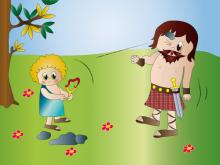
Whenever I hear someone lament that kids these days need to read their Bibles, I tell them that the Bible should be rated R for violence, nudity, rape, drug deals, and even genocide – and that’s just in the first book! Of course, as a youth pastor, I’ve found that the best way to get kids interested in the Bible is to tell them that if someone made it into a movie, it would be rated R.
The Bible and movies tell stories. Gareth points out the importance of stories in his article “It’s the Movies’ Fault/It’s not the Movies’ Fault” in which he brilliantly states that, “we could benefit from recognizing that the relationship between storytelling and the formation of human identity is crucial.” Indeed, the stories we tell are crucial to the formation of human identity, but the Bible and movies tell stories that are permeated with violence. So, the question becomes, how do we make sense of those violent stories in terms of human identity?

In the fourth chapter of John’s Gospel Jesus speaks with a woman when they find themselves alone at a well at midday. We can learn a lot from what he says to her, and from what he chooses not to say.
Jesus tells the woman, “Go, get your husband, and bring him here.” She replies, “I have no husband.” Jesus tells her “That’s right. You’ve had five husbands, and the man you’re now with isn’t your husband.”
These could have been shaming words. In her culture, to be without a husband is to risk economic ruin, and to have been divorced by your husband is to be shamed.
Had he wanted to, Jesus could have scored some serious points here: I’m a prophet, and you’re a sinner. I’m celibate, and you’re promiscuous. You are living in sin by living with a man who is not your husband.
Evidently, he didn’t want to say those things.
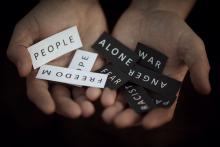
Last week was on in which what God envisions for our world seemed so very, very far away.
We watched in horror last Monday as two bombs exploded at the finish line of the Boston Marathon. We wept as we heard about the death of an 8-year-old boy, a 23-year-old grad student, a 29-year-old restaurant manager. We shuddered as we thought about the 170 people injured in the bombings, many of them losing feet or legs. We asked why. Why did this happen? How could human beings do this to others?
Tuesday, we learned about poisoned letters being sent to elected officials. Real poison, not just the poisonous words that are so much of our political dialogue. Is this really what God envisioned for us?

Sharletta Evans of Denver says it was her faith that motivated her to forgive the teens who killed her 3-year-old son, Casson, during a drive-by shooting. When she did, Evans says, she could feel the hate evaporate from her body. She has since developed a relationship with one of the young men, whom she hopes to see released from prison.
Minnesota’s Mary Johnson drew on her faith for the strength to meet with and forgive Oshea Israel, who was 16 when he killed Johnson’s 20-year-old son, Laramiun Byrd. Mary now considers Oshea, who lives next door to her, her spiritual son. The two now frequently speak together about anti-violence and the power of forgiveness.
And Mona Schlautman, whose 15-year-old son, Jeremy Drake, was kidnapped and killed in a park in Omaha, Neb., says her faith — plus her belief that it is good public policy — have led her to support changes in that state’s laws that would ensure young people who go to prison for serious crimes have meaningful opportunities to be considered for release after they have acknowledged what they did, asked for forgiveness and sought to make amends. She testified before the Pardons Board several times on behalf of Jeremy Herman, who at 17 was convicted of kidnapping her son. He was released from prison after 19 years.
Throughout the United States, people of faith are on the front lines of the effort to replace life-without-parole sentences for children with age-appropriate accountability measures that focus on rehabilitation and reintegration into society. The Juvenile Justice Week of Faith and Healing is an annual event intended to engage faith leaders and further increase awareness of individual, community and social needs arising from the current juvenile justice system.

Listen, I’m not here to bash Manti. I’m not here to ridicule or mock him. I’m not even suggesting that Manti is lying or that his statement is not accurate but we can all agree that the whole story is absolutely bizarre and the total truth has yet to be fully revealed. But because I’m a believer in people – and more so – because I believe in the power of redemption, reconciliation, and restoration, I want to see Manti do well – not just as a football player – but as a man … as a human being … and as someone who often speaks of God.
If I were Manti’s pastor …
While more details will emerge in the future, I wondered what kind of advice I would give him if I were Manti’s personal pastor. (Manti, being Mormon, is supposedly a deeply religious person.) Here are the four pieces of advice I’d give him.

For many centuries Christmas Day worshippers have been hearing these words as their New Testament reading: “For the grace of God has appeared, bringing salvation to all” (Titus 2:11). Grace, everyone used to know, is foundational to the Christian Gospel.
But this Christmas I’m noticing the surprising version of grace in Les Miserables, already seen by 60 million people as a musical and now as a film. Victor Hugo’s novel may be seen as a story of grace transforming in the life of the common man Jean Valjean and grace rejected in the life of the rigid functionary Javert.
As the story begins, Jean Valjean is being released from 19 winters of imprisonment for having stolen some bread to save his sister’s son from starving. But in the eyes of Javert, Valjean will always be a thief, which is his nature, because he has not learned the meaning of the law. Crushed under this ideological overlay, Valjean sees himself as a slave of the law — in a way remarkably similar to that of St. Paul, who makes grace and law antithetical. The chorus confirms it: “Look down, you will always be a slave.”
In his first job after prison, Valjean is deliberately underpaid. When he objects, the boss says: “Why should you get the same as honest men like me?” (Jesus once told a parable about laborers in a vineyard to open people’s eyes to grace.) Valjean concludes that society has closed every door to him. When he is refused lodging, the innkeeper says: “We’re law-abiding people here. Thanks be to God.” The conservative identification with the law is commonly made in alliance with God, while Victor Hugo seems to understand that the Christian vision identifies grace, not law, with God.

Editor's Note: Anne Marie Roderick tells her story of why she's NOT part of the 20 percent of Americans who identify with "no religion in particular." Find more stories (or share your own) HERE. Read about the study HERE.
It’s not surprising that a third of my peers say they are religiously unaffiliated. Our religious lives are too complex these days to fit in neat boxes with one-word labels. I may be a “Christian,” but does that mean that I am like other Christians? Not necessarily.
There is sometimes more truth in being a “none” — in stating what we are not — rather than trying to pin down exactly what we are. But, I choose to affiliate anyway. Here’s why I am not a “none:"

NEW YORK — Manhattan was a traffic nightmare as the United Nations General Assembly was in session and security precautions ramped up.
Iran's president gave his usual insulting address. Israel's prime minister volleyed with dire warnings of Iran's nuclear-weapons intentions. Not much was expected of a session that was more political podium than problem solving.
But the event did underscore a reality that Americans often overlook: Not everything is about us. The world doesn't turn on a politician's latest line of attack. The fine points of Obamacare or Mitt Romney's 1040 or Paul Ryan's budget? Meh.
On the one hand, this unconcern is nothing unusual; hometown affairs are always of far more interest to locals than to anyone else. I could go months without caring about Kate Middleton's topless cavorting or political show trials in Beijing.
On the other hand, it is good to be reminded that we are one piece of a vast global mosaic. We connect with others but aren't necessarily the center.
Rather than proceed as a nation-level version of the "narcissistic princess" — as one reviewer labeled tell-all author Monica Lewinsky — we should pay more attention to the connections among us.

ASSISI, Italy — Swimming against a global tide of religious violence and political polarization, about 550 religious and humanitarian leaders met recently here in the birthplace of St. Francis to propose a new way forward: love and forgiveness.
The ambitious aim of the Sept. 19-23 “Global Gathering” was nothing short of putting those values to work in some of the most hate-filled and unforgiving places on Earth. Following the example of Francis, whose feast day is on Thursday, participants pledged to make lofty ideals real through dozens of creative projects researched and funded by the Michigan-based Fetzer Institute, the conference convener.
“There’s a power in love that our world has not discovered yet,” said Fetzer President and CEO Larry Sullivan, quoting the Rev. Martin Luther King, Jr. “Let’s put our backs into the work of love and forgiveness.”

Like most people, I was deeply troubled by news of another mass shooting, this time at a Sikh temple in Oak Creek, Wis., not far from Milwaukee. On the heels of the tragic massacre in Aurora, Colo., this seemed all the more savage to me, given that it took place in a house of worship.
Maybe it’s because my wife and I work in a church and are aware of such vulnerabilities every day, but my first reaction is defensiveness. I want to raise my guard, double-check the locks and do whatever I can to ensure our safety. It’s the response that makes the most sense, after all.
Or is it?

THOSE OF US who are passionate about prison reform could talk at length about the injustices of the penal system, but prison activists and concerned citizens sometimes gloss over the internal conflicts of prisoners in their daily lives as well as the pain and fears of crime victims in local communities. The documentary Concrete, Steel, and Paint raises some essential questions about hope, forgiveness, and reconciliation through the moving story of unlikely partners—those incarcerated for committing violent crimes and those affected by violent crimes—who come together to create a mural in their community.
The film begins at Graterford Prison near Philadelphia, a maximum-security institution where men are serving long sentences for violent crimes, including homicide. The men interviewed for the film seem thirsty for opportunities for healing. One of the first prisoners we meet, Tom, says: “When you do wrong that you can’t correct, it’s horrible.” Another inmate, Zafir, tells the camera: “I don’t want my legacy to be that I was a murderer.”
The energy for a mural project came from Jane Golden, the executive director of the Philadelphia Mural Arts Program, who believes in the power of art, and murals in particular, “to shift the consciousness of a community.” Golden began working with prisoners in Graterford in the early 2000s. The men in her workshops eventually came up with the idea to reach out to the community. “I thought it was an interesting idea,” Golden says, “but I told them the only way this can possibly work is if we can get the community involved.”
After a significant amount of pushback from community members, Golden suggests making two separate mural walls to convey the different journeys of offenders and victims. “It’s healing for me to tell my story,” says the mother of a homicide victim. “Maybe it will be helpful for them to tell their story.” The film teaches viewers that there are points of similarity in these stories—hurt, loss, anger, regret—and there is a shared desire for healing and for change, but the journeys are still different and portraying them in shared space could minimize the ability to convey truth for each group. Can offenders and victims of crime ever share a platform to express pain, to ask for healing?